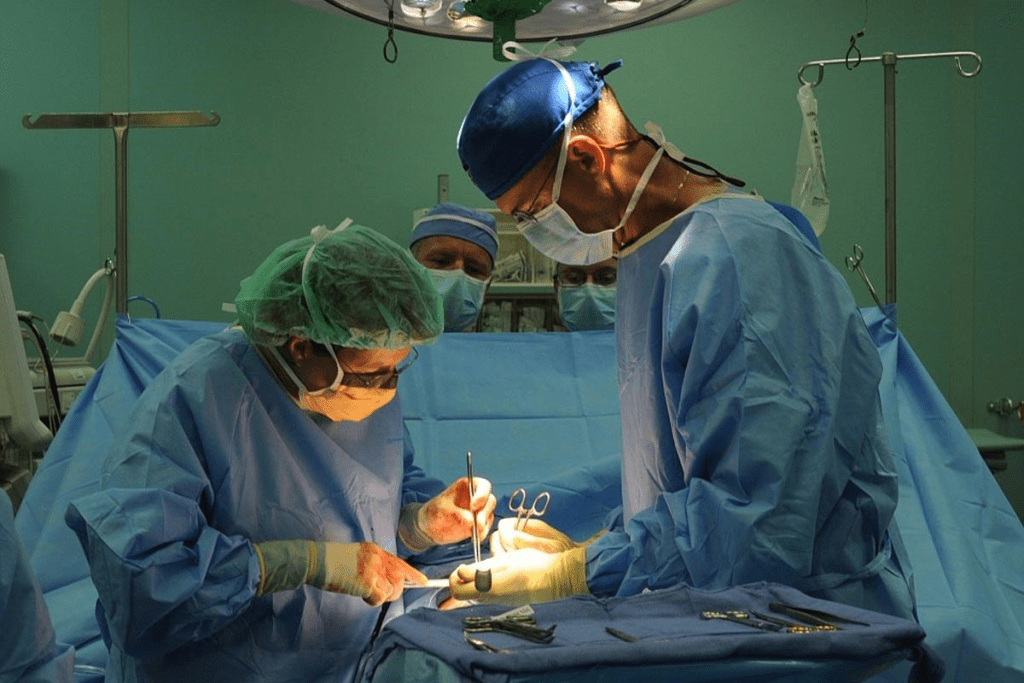Last Updated on November 26, 2025 by Bilal Hasdemir

Prostate surgery is a big decision, with age considerations being key. For example, Milwaukee Admirals President Jon Greenberg had prostate cancer surgery and recovered well. Learn the typical age limit for prostate surgery, how doctors decide eligibility, and safe options for older patients.
This shows how important it is to think about appropriateness of surgery based on health and age. There’s no fixed age limit for prostate surgery. But knowing what affects this choice is vital.
Key Takeaways
- Prostate surgery decisions are highly individualized.
- Age is just one factor considered for prostate surgery.
- Overall health plays a significant role in determining suitability.
- Successful outcomes can be achieved across various age groups.
- Consulting with a healthcare professional is essential.
Understanding Prostate Surgery and Age Considerations

Age is key when it comes to prostate surgery. It affects the type of surgery and how well the patient will do. Doctors look at age, along with other health factors, when deciding on treatment.
Types of Prostate Surgical Procedures
There are many prostate surgery options. Each one is for different reasons and has its own benefits. Here are a few:
- Radical Prostatectomy: This surgery removes the prostate gland. It’s often for prostate cancer.
- Simple Prostatectomy: This surgery takes out part of the prostate gland. It’s for BPH.
- Transurethral Resection of the Prostate (TURP): A less invasive way to fix BPH.
- Laser Surgery: Uses lasers to remove or shrink the prostate gland. It’s a less invasive option.
The right surgery depends on the patient’s age, health, and the problem being treated.
Why Age Matters in Prostate Surgery
Age is important in prostate surgery. It affects how well the patient recovers and the risks involved. Older patients might have other health problems that make surgery harder.
| Age Group | Surgical Considerations | Potential Risks |
| 50-60 years | Generally considered good candidates for most prostate surgeries. | Lower risk of complications compared to older age groups. |
| 60-70 years | May have some comorbidities; careful preoperative evaluation is necessary. | Moderate risk of complications. |
| 70+ years | Often have multiple health issues; surgery is considered on a case-by-case basis. | Higher risk of complications, including cardiovascular and pulmonary issues. |
Knowing these details helps make better choices about prostate surgery. It’s all about the patient’s age and health.
What is the Age Limit for Prostate Surgery?

To understand the age limit for prostate surgery, we need to look at both old and new medical practices. The choice to have prostate surgery depends on the patient’s age, health, and how serious their prostate problem is.
Historical Perspectives on Age Restrictions
In the past, age was a big factor in deciding if someone could have prostate surgery. Older patients were often seen as too risky because of anesthesia and recovery problems. A study said, “Age was once a big barrier to prostate surgery because of recovery worries.”
“The older the patient, the greater the risk of complications from surgery,” was a common mantra in the medical community. But, with new surgical methods and better care, this view has changed.
New, less invasive surgeries have made it possible for older patients to have surgery who were once too high-risk.
Current Medical Consensus on Age Limits
Now, doctors don’t just look at age to decide if someone can have prostate surgery. They consider the patient’s health, how long they might live, and if surgery will help. With better technology, more older men are being considered for surgery.
“The decision to perform prostate surgery on older men should be based on their biological age, not just their age,” new guidelines say. This change means doctors focus more on the patient’s health than just their age.
Factors That Influence Surgical Eligibility Beyond Age
Many factors, not just age, decide if someone can have prostate surgery. These factors help doctors figure out if surgery is right for a patient.
Overall Health and Comorbidities
A patient’s health and any extra health issues are key. Diabetes, heart disease, and high blood pressure can affect surgery and recovery. Doctors look at these to understand a patient’s health.
Having extra health issues can make surgery and recovery harder. For example, heart disease might need extra checks before surgery. Diabetes might need careful blood sugar control during surgery time.
| Comorbidity | Potential Impact on Surgery | Preoperative Consideration |
| Diabetes | Increased risk of infection and delayed healing | Optimize blood sugar control |
| Heart Disease | Increased risk of cardiac complications | Cardiac evaluation and risk stratification |
| Hypertension | Potential for blood pressure fluctuations during surgery | Control blood pressure with medication |
Life Expectancy Considerations
How long someone is expected to live is also important. Those expected to live longer are often better candidates for surgery. This is because they are more likely to benefit from the surgery in the long run.
Doctors use tools to guess how long someone might live. This helps them decide if the surgery’s benefits outweigh the risks, mainly for older patients or those with big health issues.
Functional Status Assessment
A patient’s ability to do daily tasks and stay independent is also key. Those who can do more tend to do better after surgery.
Doctors check how well a patient can move, think, and get support. This helps them guess how well a patient will do after surgery and adjust to any changes.
Looking at these factors helps doctors make better choices for patients. This leads to better results and a better life for patients.
Prostate Cancer Surgery for Men in Their 50s and 60s
Men in their 50s and 60s have a treatment option for prostate cancer that can improve their life quality. They face a big decision about surgery. It’s key to know the benefits and what to expect during recovery.
Benefits of Earlier Intervention
Surgery early on has many benefits for men in this age group. Removing the prostate gland can cure prostate cancer if it’s caught early. This method also lowers the chance of cancer spreading and the need for other treatments.
Some main advantages include:
- Potential cure for localized prostate cancer
- Reduced risk of cancer recurrence
- Minimized need for additional treatments
- Improved long-term survival rates
Experts say surgery can remove the cancer entirely. This is great for healthy men in their 50s and 60s. Jon Greenberg, who had surgery while working, shows it’s possible to succeed even in tough situations.
Recovery Expectations for Middle-Aged Men
Recovery times for men in their 50s and 60s after surgery vary. It depends on their health, the surgery type, and personal factors. Generally, middle-aged men tend to recover quickly because they often have fewer health issues than older patients.
Important recovery points include:
- Managing postoperative pain effectively
- Following a rehabilitation plan to regain strength and urinary control
- Attending follow-up appointments to monitor recovery and address any complications
By knowing these recovery aspects, men in their 50s and 60s can prepare well for surgery and recovery. This helps them make informed choices about their treatment.
Prostate Surgery Considerations for Men in Their 70s
For men in their 70s, deciding on prostate surgery is a big deal. They need to know the risks and benefits well. Their health, how long they might live, and any other health issues are key.
Before choosing prostate surgery, men in their 70s should think it over carefully. They should look at their health, how bad their prostate problem is, and how surgery might change their life.
Risk-Benefit Analysis for Septuagenarians
Older patients need to have their health checked before surgery. This includes their heart, kidneys, and any ongoing health problems. For example, managing diabetes or high blood pressure is important before surgery.
| Health Factor | Consideration | Impact on Surgery |
| Cardiovascular Health | Presence of heart disease or hypertension | Increased risk of complications during surgery |
| Renal Function | Kidney disease or impaired renal function | Potential for postoperative renal complications |
| Chronic Conditions | Presence of diabetes, COPD, or other chronic diseases | May complicate recovery or increase risk of complications |
Modified Surgical Approaches for Older Patients
Doctors often use special methods for older patients to lower risks. Minimally invasive prostate surgery is one such method. It helps patients recover faster and face fewer complications.
Techniques like laparoscopic or robotic-assisted surgery are good for older men. They lead to less blood loss, smaller cuts, and less pain after surgery. These benefits are big for men in their 70s, who might face more risks with traditional surgery.
Choosing to have prostate surgery in your 70s is a big decision. It should be made after talking to a urologist. They will consider your health and what you want. This way, older men can make choices that are right for them.
Can an 80-Year-Old Have Prostate Surgery?
Whether an 80-year-old can have prostate surgery is a complex issue. Age is a big factor, but it’s not the only one. Other things matter too.
Prostate surgery, like prostatectomy, has gotten better. It now offers good results for older men. But, deciding if an 80-year-old should have surgery is a big choice.
Case Studies and Success Stories
Many studies show that prostate surgery works well for men over 80. For example, a study in the Journal of Urology found that older men who had radical prostatectomy did as well as younger men.
What makes surgery successful for older men includes:
- Overall health: Being healthy helps a lot.
- Functional status: Being active before surgery makes recovery easier.
- Life expectancy: If you have more years left, surgery might be a good choice.
Special Considerations for Octogenarians
When thinking about prostate surgery for an 80-year-old, there are special things to consider. These include:
- Comprehensive geriatric assessment: Looking at the patient’s health, mind, and how well they can function.
- Risk-benefit analysis: Weighing the good and bad of surgery, like risks from anesthesia and complications after.
- Alternative treatments: Thinking about other options, like radiation or watching and waiting.
Choosing to have prostate surgery at 80 should be a personal decision. It depends on the person’s health and what they want.
Risks of Prostate Surgery in Elderly Patients
Choosing to have prostate surgery when you’re older is a big decision. It involves thinking about the risks, like problems with anesthesia and how long it takes to recover. As men get older, their health can affect how well they do after surgery.
Anesthesia-Related Concerns
One big risk for older men having prostate surgery is anesthesia. They might have health issues like heart disease or diabetes that make anesthesia harder. Careful preoperative evaluation is key to reduce these risks.
Anesthesiologists use the ASA Physical Status classification to check a patient’s health before surgery. This helps them choose the right anesthesia and talk about possible risks with the patient and their family.
Postoperative Complications by Age Group
Complications after surgery can differ a lot by age. Men in their 70s and 80s might face issues like urinary problems, erectile dysfunction, and heart problems more often than younger men. A study published in the Journal of Urology showed older men are at higher risk for these problems. This highlights the need for special care after surgery.
The risk of complications also depends on the patient’s health before surgery and any other health issues they have. A detailed check-up before surgery is important to spot risks and plan how to avoid them.
Long-term Quality of Life Impacts
The long-term effects of prostate surgery on older men’s quality of life are very important. Surgery can help with prostate cancer or BPH, but it can also cause lasting side effects. These can include trouble with urination, erectile dysfunction, and bowel changes.
Rehabilitation and supportive care are key to dealing with these side effects and improving life after surgery. It’s important for patients and their caregivers to know about these effects and the help available to manage them.
Age and Prostate Surgery Recovery Time
The age of a patient undergoing prostate surgery greatly affects their recovery. It’s important for men to know how age impacts recovery. This knowledge helps set realistic goals and improve care after surgery.
Recovery Differences Between Age Groups
Recovery from prostate surgery varies with age. Younger patients usually recover faster than older ones. For example, men in their 50s and 60s often face fewer complications and shorter hospital stays than those in their 70s and 80s.
A study showed men under 65 recover faster than those over 75. This is because older patients often have more health issues and less physical strength.
| Age Group | Average Recovery Time | Common Complications |
| 50-64 | 6-8 weeks | Minimal |
| 65-74 | 8-12 weeks | Moderate |
| 75+ | 12+ weeks | Higher risk of complications |
Strategies to Improve Recovery in Older Patients
While age is a big factor, there are ways to help older patients recover better. Improving health before surgery and using new surgical techniques can make a big difference. For example, robotic-assisted prostatectomy can reduce recovery time and complications.
Jon Greenberg’s story shows the value of a good plan before and after surgery. By focusing on his health and using a team of experts, Jon recovered well from prostate surgery, even at 70.
- Preoperative physical therapy to improve strength and endurance
- Optimization of comorbid conditions before surgery
- Use of minimally invasive surgical techniques
- Postoperative pain management and early mobilization
- Nutritional support and counseling
By using these strategies, older patients can improve their recovery and enjoy a better life after prostate surgery.
Prostatectomy Outcomes and Success Rates by Age
Looking at prostatectomy outcomes by age helps us understand how well the surgery works. Prostatectomy is a common treatment for prostate cancer. Knowing how age affects the surgery’s success is key for both patients and doctors.
Survival Statistics Across Age Groups
Survival rates after prostatectomy change with age. Younger patients usually do better because they’re healthier. Studies show men under 65 have higher survival rates than older men.
A study in the Journal of Urology found men under 60 have a 95% 10-year survival rate. Men between 70 and 75 have a 80% rate. Men over 75 face a higher risk of dying within 5 years after surgery.
| Age Group | 5-Year Survival Rate | 10-Year Survival Rate |
| <60 | 98% | 95% |
| 60-69 | 95% | 85% |
| 70-75 | 85% | 80% |
| >75 | 70% | 60% |
Functional Outcomes by Age
How well a man recovers after prostatectomy also depends on his age. Younger men tend to recover better because their bodies are more resilient.
A study in European Urology found men under 65 recover urinary continence faster than older men. Younger patients also have better erectile function recovery.
| Age Group | Urinary Continence Recovery | Erectile Function Recovery |
| <60 | 90% | 70% |
| 60-69 | 80% | 50% |
| 70-75 | 60% | 30% |
| >75 | 40% | 20% |
In summary, prostatectomy results and success rates change with age. Younger men generally have better outcomes, but older men can also benefit. It’s important for patients to talk to their doctors about their specific situation to make the best choice.
When Prostate Surgery Is Not Recommended Based on Age
Prostate surgery is not always the best choice, mainly for older patients with health problems. Doctors carefully think about the patient’s health, how long they might live, and the surgery’s risks.
Medical Contraindications in Elderly Patients
Some health issues make surgery too dangerous for older folks. These include serious heart disease, advanced kidney or liver disease, and brain problems. A study in the Journal of Urology showed that those with many health problems face higher risks after surgery.
Quality of Life Versus Quantity of Life Decisions
Choosing to have surgery also means thinking about how it might affect the patient’s life quality. For some older men, the surgery’s risks might be too high, if they don’t have much time left.
It’s important to consider the patient’s ability to recover from surgery. Things like how well they can move, think, and have support from others help decide if surgery is right.
In summary, while surgery can help many, it’s not right for everyone, like older patients with serious health problems. A thorough check-up with a doctor is key to finding the best option.
Alternative Treatments for Elderly Prostate Patients
There are alternative treatments for elderly prostate patients when surgery is not a good option. As men get older, their health, other health issues, and how long they might live are key in choosing the right treatment for prostate problems.
Active Surveillance Protocols
Active surveillance means watching prostate cancer closely without starting treatment right away. It’s a good choice for older patients with low-risk cancer or those who don’t have much time left.
Radiation Therapy Options
Radiation therapy is another option for older prostate patients. It can be given from outside the body (external beam radiation therapy) or from inside (brachytherapy). The choice depends on the cancer’s stage, the patient’s health, and what they prefer.
Hormone Therapy Approaches
Hormone therapy, or androgen deprivation therapy, lowers male hormones that help prostate cancer grow. It’s often used with other treatments or for those who can’t have surgery or radiation.
Emerging Minimally Invasive Treatments
New treatments include focal therapy, which only targets the cancerous part of the prostate. Other new, less invasive methods are being studied for their safety and effectiveness in older patients.
| Treatment | Description | Suitability for Elderly |
| Active Surveillance | Monitoring prostate cancer without immediate treatment | Highly suitable for low-risk cancer or limited life expectancy |
| Radiation Therapy | External or internal radiation to kill cancer cells | Suitable; choice depends on overall health and cancer stage |
| Hormone Therapy | Reducing male hormones to slow cancer growth | Suitable; often used with other treatments or when surgery isn’t an option |
| Focal Therapy | Targeting the cancerous area while sparing the rest of the prostate | Emerging; potentially suitable for localized cancer |
How to Discuss Age and Prostate Surgery With Your Doctor
When it comes to prostate surgery, age plays a big role. It’s important to talk openly with your urologist. Discussing your age and health can help find the best treatment for you.
Essential Questions to Ask Your Urologist
When you talk to your urologist about surgery, ask the right questions. This will help you understand your options better. Here are some key questions to ask:
- How does my age affect my eligibility for prostate surgery?
- What are the risks and benefits of surgery for someone my age?
- Are there other treatments that might be better for someone my age?
- How will my health and any other conditions affect surgery and recovery?
- What are the expected results of the surgery, and how will it change my life?
These questions can give you important insights into your options. They help you make a well-informed choice.
Shared Decision-Making Process
Choosing to have prostate surgery should be a team effort. You and your doctor should work together. This means looking at your personal wishes, medical history, and the latest research on treatments.
This approach makes sure you’re fully informed and involved. It’s key to share your worries, hopes, and any fears about the surgery.
| Factors to Consider | Questions to Ask | Importance |
| Age and Overall Health | How will my age and health impact my surgery and recovery? | High |
| Treatment Goals | What are my treatment goals, and how can surgery help achieve them? | High |
| Alternative Treatments | Are there other treatment options available that might be more suitable for me? | Medium |
| Potential Risks and Complications | What are the possible risks and complications of prostate surgery? | High |
By working together and asking the right questions, you can make a choice that fits your needs and wishes.
Conclusion
Knowing the age limit for prostate surgery is key to making good choices about treatment. Age is just one thing that matters when deciding if surgery is right.
When thinking about surgery, age is important but not the only thing. A person’s health and how long they might live also matter a lot. These factors help decide if surgery is a good idea.
For older people, choosing the right treatment for prostate cancer is very important. It’s about weighing the good and bad sides of each option. A doctor’s advice is vital to pick the best treatment for each person’s health and life goals.
In the end, the choice to have prostate surgery depends on many things. A patient’s age, health, and what they want are all important. A careful look at each person’s situation is needed to make the right decision.
FAQ
What is the best age for prostate cancer surgery?
The best age for prostate cancer surgery depends on health, life expectancy, and cancer stage. Men in their 50s and 60s are often good candidates.
Is there an age limit for prostate removal?
There’s no strict age limit for prostate removal. But, older men with serious health issues or short life expectancy might not be good candidates.
Can an 80-year-old have prostate surgery?
Yes, an 80-year-old can have prostate surgery. But, it depends on their health, how well they function, and how long they might live. They might need special care and approaches.
What are the risks of prostate surgery in elderly patients?
Elderly patients face higher risks of complications from anesthesia and surgery. They also might see a big impact on their quality of life. But, these risks can vary based on their health and age.
How does age affect recovery time after prostate surgery?
Older men usually take longer to recover from prostate surgery. But, using less invasive surgery and special recovery plans can help them heal faster.
What are the alternative treatments available for elderly prostate patients?
Elderly prostate patients have options like active surveillance, radiation, hormone therapy, and new, less invasive treatments. The best choice depends on their health and cancer type.
How should I discuss my age and prostate surgery options with my doctor?
When talking to your doctor about age and surgery, ask about your health, life expectancy, and cancer stage. Working together can help you make a good choice.
What are the benefits of prostate surgery for men in their 50s and 60s?
Men in their 50s and 60s can benefit from prostate surgery. It can control cancer, reduce symptoms, and improve their quality of life. Early treatment can lead to better results.
Are there any age-related considerations for prostate surgery?
Yes, age is a key factor in prostate surgery. Older men might need special surgery and their health and life expectancy must be carefully checked.
What are the outcomes and success rates of prostatectomy across different age groups?
Prostatectomy results vary by age. Younger men often do better, but older men can also have good outcomes. It depends on careful selection and special surgery approaches.
References
- National Comprehensive Cancer Network. (2025). Prostate Cancer Guidelines. https://www.nccn.org/professionals/physician_gls/pdf/prostate.pdf
- American Urological Association. (2023). Prostatectomy and Age Considerations. https://www.auanet.org/guidelines






